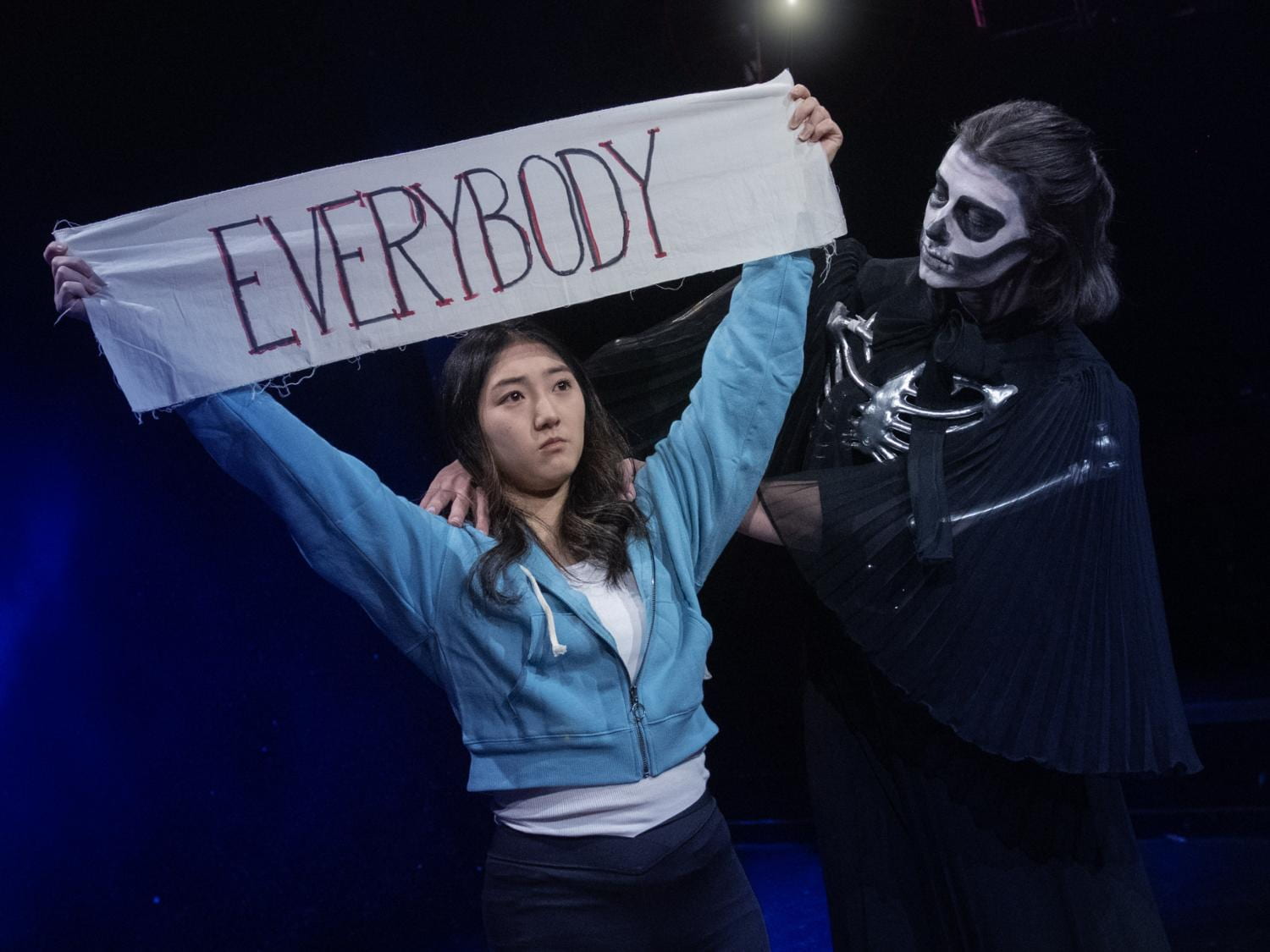By Annika Shastry, Editor-in-Chief ∼
On Friday, February 24th, I had the pleasure of catching the penultimate show of Penn State Centre Stage‘s play “Everybody,” and I absolutely loved it.
Upon entering the Pavilion Theatre, we were ushered to our seats by a very enthusiastic and helpful man. We thought nothing of it at the moment, and before the show began the usher stepped onto the stage to offer a few disclaimers about turning off our phones and keeping noise to a minimum. To our surprise, the usher lingered on stage, getting more and more theatrical, until it finally clicked…
He was a character in the show and the show had already started!

Caption: Jackson Pavlik playing God in “Everybody.” Credit: Patrick Mansell / Penn State. Creative Commons
If I can use any word or phrase to describe “Everybody,” it would be self-aware. The play is conscious of the fact that it is a play and that there are people in the audience watching as it goes on. It blurs boundaries between what is real and what is a performance for the sake of making a point about human nature.
The play, itself, is about God (Jackson Pavlik) feeling fed up with his creation and demanding his assistant, Death (Julia Salvato), collect Everybody and put them on trial to determine the purpose of their life. What/who did Everybody live for? What did they value? And can it save them from Death?
What makes live performances unique is that they differ from night to night and show to show. Actors play their roles differently each time, tweaking their deliveries of certain lines, or experimenting with certain actions. But what makes “Everybody” special is that every show is vastly different from the one that came the night before.
Five different actors (Jill Aebli, Megan Irwin, Justin Matthew Roldán Figueroa, Kade Leous, and Tina Nakata) play Somebodys and at the beginning of every show, the cast conducts a live lottery to determine the roles they will play that night. One of them gets selected to be Everybody and the others get assigned the roles of abstract concepts like Friendship, Kinship, Cousin, Stuff, Mind, 5 Senses, Beauty, and Strength.

Tina Nakata, left, and Hazel Giacomucci in rehearsal for “Everybody”. Nakata has been selected through that night’s lottery to play Everybody. Credit: Patrick Mansell / Penn State. Creative Commons
During the show I witnessed on February 24th, Aebli was selected through the lottery to play Everybody, Irwin played Kinship and Beauty, Figueroa played Friendship and Strength, Leous played Cousin and Mind, and Nakata played Stuff and Senses. Each did a fantastic job, and I left the theatre wishing that I could see all of the different iterations of the play they had performed thus far.
One of my favorite moments within the play was a salsa-like dance sequence performed by a group of skeletons around the characters of Love (Corey Hill) and Everybody. The sequence starts off with Love and Everybody being afraid and intimidated by what seems like a dance of death, but slowly embracing the situation they find themselves in and dancing along with the skeletons.
As I watched from the audience, I remember feeling quite moved. We can either sit paralyzed in fear of death or poke fun at it and try to make the most of what we have. It made me want to dance, too.
I’d be remiss if I didn’t mention the set and production design of the play, which was fantastic. At each corner of the theatre was a different setting: the room of an infant, a diner, the room of a teenager, and what seemed to be a school/graduation location. Lights in each setting lit up as disembodied voices from Everybody’s real life spoke to them about their dream (which is the play).
The stage was simply set with different kinds of chairs, a coffee table with LIFE magazines, and the game of LIFE on it. Atmospheric and astral lights shun on a blank background as God first appeared. Smoke machines blared when death was imminent. It was all very clever, meticulous, and intentional.
“Everybody” is a modern adaptation of a medieval morality play called “Everyman.” It being a morality play means that it ends quite abruptly and with a moral for the audience to take away. Some people I know left the play dissatisfied because the ending was comparatively less nuanced than the rest of the play. Others reveled in the simplicity of the ending despite the complexity of what came before. But we all walked away having experienced something undeniably thought-provoking and impressive.
Tickets are currently on sale for Penn State Centre Stage’s newest show, “Into the Woods,” which began running on March 2nd and will continue running after Spring break from the 14th to the 18th. Make sure to visit Penn State Centre Stage‘s website to view future shows and events.
 Annika Shastry is a second-year Schreyer Honors College student and English major. As a lover of words and art, Annika is involved in many publications on campus such as Kalliope, for which she is the production head, and The Daily Collegian, for which she is a graphic designer. She is excited to add KLIO to the mix and serve as KLIO’s Editor-in-Chief this semester.
Annika Shastry is a second-year Schreyer Honors College student and English major. As a lover of words and art, Annika is involved in many publications on campus such as Kalliope, for which she is the production head, and The Daily Collegian, for which she is a graphic designer. She is excited to add KLIO to the mix and serve as KLIO’s Editor-in-Chief this semester.